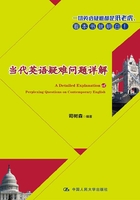
16 副词alone通常位于动词之后作状语
问:我是一名英语自学者,想请教一个问题:alone用作副词表示“单独一个”或“独立地”时,只能放在动词后面吗?它可否位于句首修饰全句呢?有人说不行,真是这样吗?
答:常用词alone用作副词时,意为“单独地,独自一个地”(by oneself,without anyone else),通常多位于(短语)动词之后,作状语。例如:
(1)He is not married and lives alone.
(2)The baby let go of the side of the crib and stood alone.
(3)You’re hardly fit to travel alone at present.
(4)I can’t carry on alone any longer; I’ll have to get help.
上述用法并不绝对,alone表示强调时也可位于句首,尤其是在文学作品中。例如:
(5)Alone, she stood for a moment before the glass looking at the effect of her silk attire.
应该注意,当alone意为“仅仅,只有”(by itself,only)时,则通常位于相关词语(如名词或代词)的后面。例如:
(6)Smith alone knows what happened.
(7)The cost of the hotel alone is very high; meals and air travel cost extra.
(8)Beauty alone cannot make you successful in your career.
(9)He alone is not responsible for it.
alone有时也可置于表示确切时间概念(或单位)的词之后。例如:
(10)During 1997 alone, 17 people lost their lives in three arson fires.